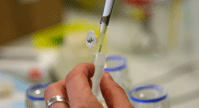Acral Mutilation Syndrome (AMS)
Description:
Acral Mutilation Syndrome (AMS) is a rare autosomal-recessive genetic disorder that affects sensation in the extremities of dogs. This results in progressive mutilation of their pads and paws due to the absence of pain. Affected dogs will over-groom, lick, or bite their pads and paws to the point of bleeding and ulceration. Often times, affected puppies will also be smaller than the rest of their littermates.
In severe cases, the dog will sever claws, digits, and footpads resulting in swollen, reddened paws, paronychia (infection of the tissue adjacent to the nail), ulceration on the bottom and top of the paws, nail loss, and painless fractures. Single or multiple feet can be affected, though dogs can walk without pain or lameness. Motor skills, coordination, and reflexes all appear to be normal.
A mutation in the regulatory region of GDNF reduces levels of GDNF protein, which affects the axon development in the neurons of the dog. This is what decreases pain and temperature sensation in the dog.
Issues associated with AMS include bacterial and fungal infections, as well as ulcers. Elizabethan cones and anti-anxiety medicine are used to cope with the disease. If the disorder proves to be unmanageable, euthanasia is commonplace.
Because AMS is recessive, a dog must inherit a copy of the mutation from each parent in order to be affected. No signs of AMS will appear if the dog has only one copy of the mutation, although it will be a carrier of the disease. When breeding two carriers together, there is a 25% chance per puppy born that it will develop symptoms of AMS.
Acceptable Sample Types:
Animal Genetics accepts buccal swab, blood, and dewclaw samples for testing. Complimentary sample collection kits are available and can be ordered at Canine Test Now.
This Test Is Relevant For the Following Breeds:
|
|
|
|
|
|
Results:
Animal Genetics offers DNA testing for canine Acral Mutilation Syndrome (AMS). The genetic test verifies the presence of the recessive mutation and presents results as one of the following:
| AMS/AMS | Affected | Dog is homozygous positive for the mutation associated with Acral Mutilation Syndrome. |
| n/AMS | Carrier | Dog has one copy of the mutation associated with Acral Mutilation Syndrome. |
| n/n | Clear | Dog is negative for the mutation associated with Acral Mutilation Syndrome. |
References:
Plassais J, Lagoutte L, Correard S, Paradis M, Guaguère E, HeÂdan B, et al. (2016): A Point Mutation in a lincRNA Upstream of GDNF Is Associated to a Canine Insensitivity to Pain: A Spontaneous Model for Human Sensory Neuropathies. PLoS Genet 12(12): e1006482. doi:10.1371/journal.pgen.1006482.
Submit a Sample for Testing:
To submit a sample for testing please go to Canine Test Now.
To
order a sample collection kit please go to order sample collection kits.
Cost per sample is $45.00. Please see our Canine Fee Schedule for all test rates.










